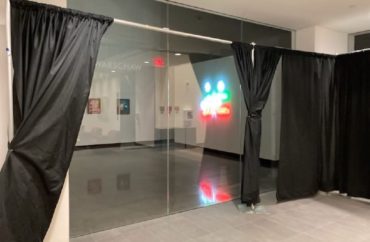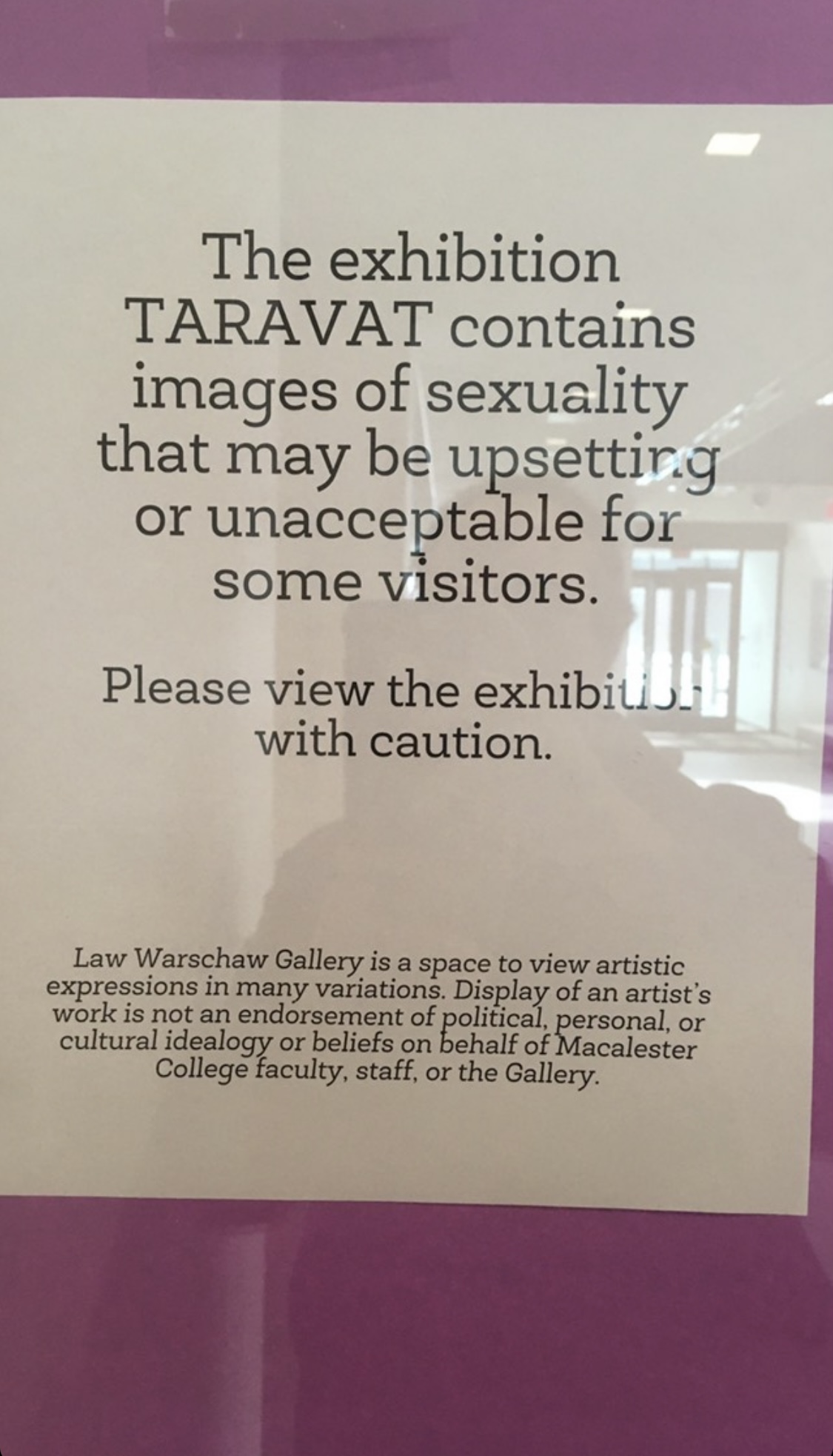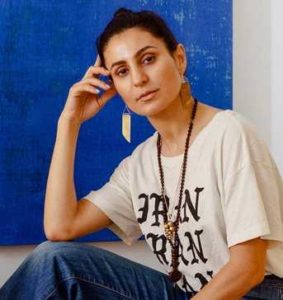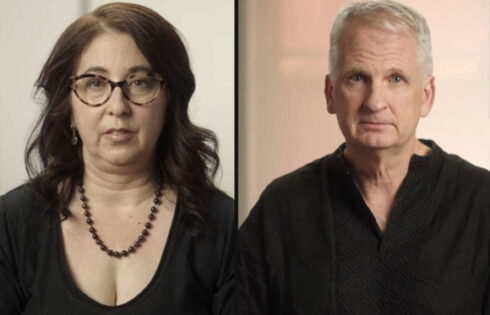
Artist said the gallery assured her that her work would not present problems
An exhibit at Macalester College’s art gallery was briefly closed and then reopened by the college with content warnings and pieces concealed behind curtains after some Muslim students expressed concern.
Some artwork displayed in the exhibition at the Law Warschaw Gallery by Iranian-American artist Taravat Talepasand depicted partially clothed women wearing a hijab or a niqab.
The exhibition, TARAVAT, is “a survey of Taravat Talepasand’s signature work from the last fifteen years,” according to the gallery event description. The exhibition opened Jan. 27 and is scheduled to remain on display until March 10 at the Minnesota campus.
“Talepasand explores how women navigate the geographic and physiological boundaries between East and West, revealing women’s bodies and perspectives becoming surfaces imprinted with the uncertainties of political and social upheavals,” the description stated.
However, a petition submitted by some Muslim students and others associated with the college expressed concern with the exhibition’s depiction of female subjects, calling its display problematic and harmful.
“There were numerous pieces shown with the Talepasand work that depicted various mediums from paintings to sculptures of Hijab and Niqab wearing women in overtly sexualized way,” according to a petition submitted to the college “in support of Macalester College Muslim Students and Community.”
“The hijab is a symbol of god and faith to billions of Muslims everywhere,” the petition authors continued. “This lack of understanding, nuance and context is largely missing in the work being displayed.”
“Though we respect the principle of academic freedom, we are also simultaneously aware that freedom, like art, does not simply exist in a vacuum,” they stated. “The decision to display and continue to display this exhibition despite the harm it perpetuates is a deeply problematic issue. It is targeting and harming an already small community that exists on this campus.”
The college briefly closed the exhibit, then reopened it “after a short pause” following “several conversations with students, faculty, and staff to consider multiple perspectives from Muslim communities on campus, worked with the artist, and supported gallery staff,” according to an email sent to students on Feb. 6, Sahan Journal reported.

The college “prepared the gallery to prevent unintentional or non-consensual viewing of certain works and added a content warning [pictured],” according to the email.
That involved “closing the exhibit for a weekend; holding a community conversation; temporarily shrouding the gallery in black curtains; and then reopening the exhibit with a content warning and frosted glass on some of the gallery windows,” Sahan reported.
‘Too much sensitivity’ doesn’t prepare students for the ‘real world,’ artist said
The closure of the exhibit was “offensive and ethically wrong…in terms of putting the black curtains over the windows,” artist Taravat Talepasand told The College Fix in a telephone interview.
Talepasand said nobody warned her ahead of time that black curtains would be going up to hide her artwork. She found out about the curtains through faculty emails, she said.
Despite the closure of the exhibition, the artwork was well received by attendees on opening night, Talepasand said.
Despite Talepasand feeling supported, she shared that the gallery stopped communicating with her after the exhibition was censored. She provided some potential solutions to the gallery, such as writing a content warning on the door.
Based on the gallery owner’s feedback, Talepasand added more context to some art pieces on display, along with QR codes, to lead people to information on the meanings behind the work.
Ahoo Najafian, an assistant professor of Islamic studies who led the gallery conversation with Talepasand on opening night, and Tia-Simone Gardner, an assistant professor of media and cultural studies, did not respond to The Fix‘s request for comment.
 Talepasand (pictured, right) told The Fix that a potential issue in schools today is that “too much sensitivity doesn’t prepare them for what’s out there in the real world.”
Talepasand (pictured, right) told The Fix that a potential issue in schools today is that “too much sensitivity doesn’t prepare them for what’s out there in the real world.”
“Trigger warnings are being used all the time. … I read professors, even tenured, are losing their jobs for accidentally slipping up and saying something or being misunderstood,” she said.
As a teacher as well as an artist, Talepasand doesn’t “put up any walls or tell any of my students that they shouldn’t be saying what they’re saying, or that what they’re thinking or saying doesn’t matter,” she said.
When asked what she hopes will come from this, Talepasand said she wants students and faculty to remember how we can “speak our minds and be open to asking questions and promoting conversations, whether they be in a classroom or in a gallery on campus.”
Just over a mile away, Hamline University in St. Paul also faced issues over representation of Muslim culture in the arts.
Professor Erika López Prater was fired for sharing historic images of the Prophet Muhammad in an art history class. Conflict ensued, and faculty at the university shortly called on the college president to resign over the incident, The Fix reported.
Prater later sued the private university with accusations of creating “emotional distress” and “violations of the Minnesota Whistleblower Act,” The Fix reported.
Talepasand, aware of the incidents at Hamline College, had asked the Law Warschaw Gallery ahead of time if students might have an issue with the show, she told The Fix. She said the chairperson assured her this was not a concern.
Prater shared support for artist Taravat Talepasand when she learned the exhibition was briefly closed and censored.
“I…personally think that we should support the way in which Taravat embraces and interrogates the notion of blasphemy, in the spirit of open expression that the visual arts afford…with a sharp and critical attention to oppressive current events in Iran that are very relevant to her artistic practice,” Prater said in a statement Talepasand shared with The Fix.
MORE: Don’t leave religion to DEI
IMAGES: Taravat Talepasand
Like The College Fix on Facebook / Follow us on Twitter






Please join the conversation about our stories on Facebook, Twitter, Instagram, Reddit, MeWe, Rumble, Gab, Minds and Gettr.